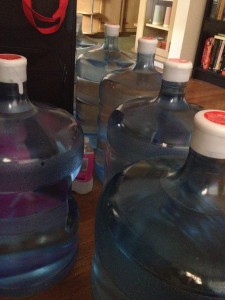A few quick notes on the results of my DNA analysis from 23andMe
23andMe got back to me a couple weeks ago, my account automatically loaded with information about health and haplotypes. There’s been a lot to digest, and a weird sort of social media experience, like being on a facebook where people only care about surnames and SNPs and only poke you to suggest sharing genomes.
And oddly, my main recurring thought has been, « but I like Brussels sprouts! »
The first thing I checked was the Y-DNA haplogroup, the clue to my paternal ancestry across the millennia. Haplogroup R1a1a. Spent the last glacial maximum in the Black Sea refuge. The most common haplotype in Eastern Europe. No surprise there, but a lot of material to cover in future posts. Since I spent most of my life not even knowing what my father looked like, I tend to be obsessively curious about his background.
Then the traits – that lactase question. Genetically, milk has no quarrel with me. If there are issues when I eat dairy, it’s not my ancestors’ fault. Bitter taste sensitivity was a surprise, because I’ve always loved broccoli, and at least as an adult, I’ve been a fan of Brussels sprouts. It’s true they can be bitter. In fact, I realized that they taste a lot like a pint of Guinness. That this trait is genetic has actually been understood since the 1930s, and actually used to be used as a paternity test!  What doesn’t make any sense to me is the absence of discussion about olives. People with this bitterness sensitivity can’t possibly like olives, but certain green vegetables are always held up as the main victim of this trait. I actually feel guilty about not liking olives, because they’re supposed to be so good for you, and it’ll be a relief to blame this on a genetic trait.
Finally health, or really, threats to health. 23andMe won’t let you see the Parkinson’s and Alzheimer’s risk until you read yet more info and deliberately « unlock » the file. My risk for Alzheimer’s is 4 in 100, as compared to your average American’s 1in 100 risk. That was the worst of it. With a pretty clean family record in dementia of any kind in my long-lived grandparents and near relatives, it’s not something that will worry me. There were slightly elevated risks for Parkinson’s, heart disease, and Type 1 diabetes. Thankfully, most of my lifestyle choices are ones that should allow nurture to offset nature. Coffee drinking, for example, has been found to correlate with later onset of dementia, and better memory retention even if it does set on. And my doctors are always happy with my calm heartbeat and healthy blood pressure.
Where is the less than average risk? Most of the conditions my hypochondria throws at my imagination when I’m not feeling well. So much for that.
The last category of information, the least relevant to me since I don’t have kids, is the part about what your genes carry and may pass on. In my case, zilch. No congenital defects, no quirks, none of the stuff that made House so fascinating to watch (hemochromatosis, for example).



